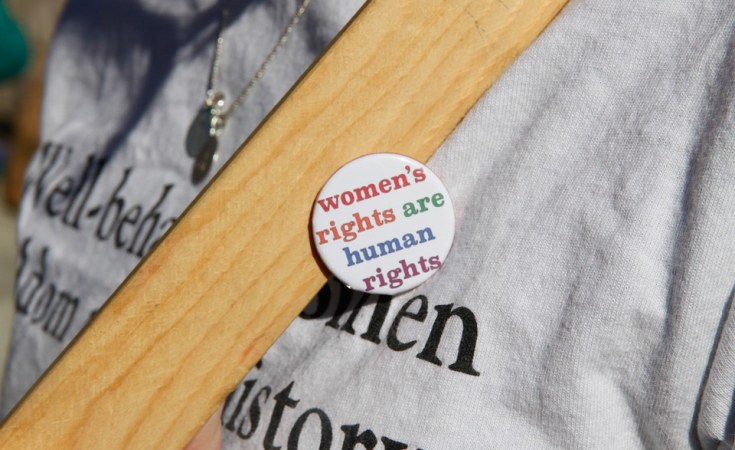The minister's presentation of the communique at the end of the 23rd National Council on Women Affairs in Calabar, on 22 August, was the first opportunity to voice over her vision.
Barrister Uju Kennedy-Ohanenye, the new Minister of Women Affairs, has a new vision for women's economic empowerment (WEE). The new vision signals both continuity and departure from previous strategies and brings together gender-based violence (GBV) and WEE in an integrated model. Since being sworn in on 21st August, Mrs Uju has been clarifying her new paradigm in a series of strategic public events as well as through press releases of the Ministry's Media Unit.
The minister's presentation of the communique at the end of the 23rd National Council on Women Affairs in Calabar, on 22 August, was the first opportunity to voice over her vision. This was soon followed up by a Press Release on 1st September as she addressed the Attorney General, the IGP, UN-Women, UNICEF, and African Lawyers Association. In three strategic events which quickly followed, the minister refined her vision at the 23rd September meeting of the Federal Ministry of Women Affairs (FMoWAs); the 28th September meeting of partners and NGOs at the offices of the FMoWAs; and most recently at a meeting of the Office of the Attorney General of the Federation and UNDP on Tuesday 3rd October.
For the development Research and Project Centre (dRPC), a Nigerian non-profit, which has been shadowing the minister's passionate pronouncements since Calabar, the minister's vision appears to both challenge and align with cutting-edge theories linking GBV and WEE. From her statements, Ms Kennedy-Ohanenye's first premise seems to be the goal of ending GBV through both GBV response and GBV prevention strategies. Her idea seems to be GBV response through the criminal justice system spearheaded by innovative GBV mobile courts. With regard to GBV Prevention - she seems to envisage a two-pronged strategy. Strategy one is to engage new advocates of traditional and religious leaders who, she argues are best placed to reach neglected rural communities with messages of the harm caused by cultural practices such as female genital cutting. The second leg of the GBV prevention strategy is where women's economic empowerment comes in. The minister argues for equipment, machinery, finances, and capacity building to equip economically active women, enabling them to generate sustainable income to uplift and protect women, children and households.
That the minister links gender-based violence reduction strategies to women's economic empowerment, setting priorities for her ministry, is not surprising as this is frontier thinking in development circles led by the UN-WOMEN, UNFPA, World Bank, Measure Evaluation and the International Centre for Research on Women (ICRW).
For the UNFPA - "It is increasingly clear that gender-based violence, women's economic empowerment, and sexual and reproductive health and rights are interlinked. Programming in any one area alone, without linkages to others, is incomplete." The World Bank argues that "poverty is a risk factor associated with gender-based violence; it also often intersects with and reinforces gender inequality. Various microfinance and other economic empowerment approaches have been implemented to try to address this intersection."
Not surprisingly, one of the World Bank's first think pieces, in the 2019 Nigeria For Women Project (NFWP), explored the intersectionality between GBV and WEE, laying out a framework for GBV mitigation in WEE programming.
By linking GBV and WEE, the new minister has set the bar rather high. The minister may well have a challenge measuring, monitoring and mobilizing to achieve both GBV and WEE objectives and to also track and trace how successes in one area impact the other.
The good news for the minister is that she is taking over the reign of leadership at a juncture where the Nigeria for Women Scale-up programme with backing from the World Bank offers financial, technical and conceptual tools to support the ministry on its new journey to address GBV and WEE in an interrelated and perhaps integrated manner. The minister can also tap into technical expertise for inclusive WEE policy implementation of the Albright Stonebridge Group (AGS) which led to the design of the WEE policy with support from the Bill and Melinda Gates Foundation. But perhaps the lowest hanging fruit that the minister can immediately tap into is the multi-stakeholder HiLAC whose GBV and WEE sub-committees can be put to work to support the minister's vision. Finally, the 2022 National Monitoring and Evaluation Policy provides a golden opportunity for the Federal Ministry of Women's Affairs to blaze the trail by generating evidence and providing proof of concept of how inclusive WEE programme design can push back, reduce and nullify GBV.
Judith-Ann Walker (PhD) is the Executive Director of the development Research and Projects Center (dRPC) a registered non-profit dedicated to building social capital for inclusive development.


